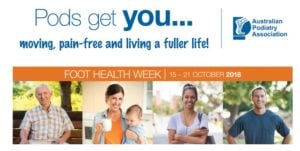Think feet this week! #FootHealthWeek
- Edgard Diaz
- October 15, 2018
- News
Foot Health Week 15-22 October 2018
The feet are the body’s foundations so need looking after, but they are often neglected and ignored until pain occurs said podiatrist, Dr Abbie Najjarine – Principal at Dr. Abbie Clinics, Kirrawee and around New South Wales (NSW) – today as Foot Health Week commenced. #FootHealthWeek
“Most take their feet for granted from the word go, neglecting their care which is when people can end up in clinics like mine, so this week we want people to think about their foot,” he said.
“I see all sorts of patients, from children who have lower limb issues early in life, to the elderly and sportspeople who are super fit but really give their feet a bashing,” he said.
“Sometimes the most healthy have the most foot and lower limb injuries because they are very active, but complaints like plantar fasciitis can be avoided by good foot care, such as stretching and massage after athletic exertion,” said Dr Najjarine.
“If you’re a very active person it’s important to take the precautions to prevent injury and keep your feet healthy.
“Note that many injuries can relate to biomechanical anomalies that should to be assessed and checked by a podiatrist,” said Dr Najjarine.
The most common foot ailments caused by over use and injury are:
Plantar Fasciitis – the stabbing pain experienced with this condition is usually worse in the morning because your feet are cold and not stretched and this may ease during the day. The key to relief is stretching and icing, or if very painful shock wave therapy has been shown to have a positive effect in around 80% of patients.
Stress Fracture – this is when minute cracks or fractures appear in the legs and feet, causing them to be extremely tender and sore. It is common in runners who over exert themselves by extending their kilometres too soon or who are running with a bad gait (which can be fixed through biomechanical assessment and treatment). A stress fracture will take an athlete off the field and rest and wearing an orthotic boot is the best treatment .
Sprained Ankles – Along with the base of the feet themselves the ankles take the load when exercising and sprains occur when the foot hits an obstacle or a weakness occurs, that causes the ankle to roll one way or another, creating a sprain, which will make the ankle and possibly the foot as well to swell and get stiff. Compression, rest, ice and elevation is the treatment. Ensuring you know your biomechanics, have good shoes and are running on even surfaces will help you to avoid this type of injury.
Achilles pain – This happens when tendons in the back of the heel and lower leg become inflamed when they are taking too much pressure caused by tight calve muscle. If the rupture is serious surgery may be required. Stretching, massage and general lower limb maintenance will help prevent this, and not pushing yourself over your limit.
Heel Spurs – These are common in people with flat feet and is when bone forms on top of bone, caused by tight ligaments plus constant motion and friction in ill-fitting footwear. If you are on your feet a lot, have flat feet or are an athlete you need to watch for these. Stretching is one way to treat and orthotics will help those with flat feet to avoid future recurrence.
Turf Toe – This is another injury caused by sports and bad footwear to boot. It happens when your big toe bends beyond its normal motion range and hurts more when bending the toe upwards. Symptoms will be swelling and pain. Rest and taping the toe is a way of treating this issue.
Growing Pains – ‘Growing pains’ do not exist! If growing pains were a normal occurrence, then all children would experience it – this is not the case. ‘Growing pains’ are actually a biomechanical anomaly associated with growth spurts and can be treated.
For those who are not athletes or do not over use their feet, being foot aware should be top of their list said Dr Najjarine.
“Keeping an eye on your feet will also help you keep an eye on your overall health as the feet can often indicate other health issues, such as numbness could mean circulatory or even heart problems. When in doubt see your GP or podiatrist,” he concluded.
Dr. Abbie Clinics are located around NSW in Kirrawee (Head Office), Sydney (city), Randwick (children’s only), Hornsby (children only), Narrabri, Norwest, Charlestown, Hamilton and Thornton.
_____________________________________________________________________________________
To arrange interviews please contact Sharon Kelly on 0414 780 077 or call Dr. Abbie Clinics on 1800 DR ABBIE


